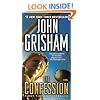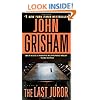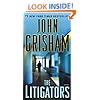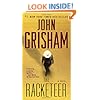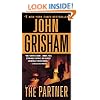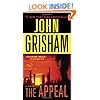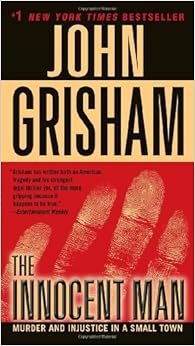
The Innocent Man
and over one million other books are available for Amazon Kindle. Learn more


Flip to back
Flip to front

The Innocent Man: Murder and Injustice in a Small Town Mass Market Paperback – March 27, 2012
See all 46 formats and editions
Hide other formats and editions
| Amazon Price | New from | Used from |
|
Hardcover, Print
"Please retry"
|
$0.90 | $0.01 |
|
Audio CD, Abridged, Audiobook
"Please retry"
|
$10.80 | $3.50 |
|
Unknown Binding
"Please retry"
|
—
|
$7.00 | $7.00 |

$8.99
FREE Shipping on orders over $35.
In Stock.
Ships from and sold by Amazon.com.
Gift-wrap available.
NO_CONTENT_IN_FEATURE
Start reading The Innocent Man on your Kindle in under a minute.
Don't have a Kindle? Get your Kindle here, or download a FREE Kindle Reading App.
Don't have a Kindle? Get your Kindle here, or download a FREE Kindle Reading App.
Best Books of the Month
Want to know our Editors' picks for the best books of the month? Browse Best Books of the Month, featuring our favorite new books in more than a dozen categories.
Want to know our Editors' picks for the best books of the month? Browse Best Books of the Month, featuring our favorite new books in more than a dozen categories.
Product Details
Would you like to update product info or give feedback on images?.
|
Editorial Reviews
Amazon.com Review
John Grisham tackles nonfiction for the first time with The Innocent Man, a true tale about murder and injustice in a small town (that reads like one of his own bestselling novels). The Innocent Man chronicles the story of Ron Williamson, how he was arrested and charged with a crime he did not commit, how his case was (mis)handled and how an innocent man was sent to death row. Grisham's first work of nonfiction is shocking, disturbing, and enthralling--a must read for fiction and nonfiction fans. We had the opportunity to talk with John Grisham about the case and the book, read his responses below. --Daphne Durham
20 Second Interview: A Few Words with John Grisham
 Q: After almost two decades of writing fiction, what compelled you to write non-fiction, particularly investigative journalism?
Q: After almost two decades of writing fiction, what compelled you to write non-fiction, particularly investigative journalism?
A: I was never tempted to write non-fiction, primarily because it's too much work. However, obviously, I love a good legal thriller, and the story of Ron Williamson has all the elements of a great suspenseful story.
Q: Why this case?
A: Ron Williamson and I are about the same age and we both grew up in small towns in the south. We both dreamed of being major league baseball players. Ron had the talent, I did not. When he left a small town in 1971 to pursue his dreams of major league glory, many thought he would be the next Mickey Mantle, the next great one from the state of Oklahoma. The story of Ron ending up on Death Row and almost being executed for a murder he did not commit was simply too good to pass up.
Q: How did you go about your research?
A: I started with his family. Ron is survived by two sisters who took care of him for most of his life. They gave me complete access to the family records, photographs, Ron's mental health records, and so on. There was also a truckload of trial transcripts, depositions, appeals, etc., that took about 18 months to organize and review. Many of the characters in the story are still alive and I traveled to Oklahoma countless times to interview them.
Q: Did your training as a lawyer help you?
A: Very much so. It enabled me to understand the legal issues involved in Ron's trial and his appeals. It also allowed me, as it always does, to be able to speak the language with lawyers and judges.
Q: Throughout your book you mention, The Dreams of Ada: A True Story of Murder, Obsession, and a Small Town. How did you come across that book, and how did it impact your writing The Innocent Man?
A: Several of the people in Oklahoma I met mentioned The Dreams of Ada to me, and I read it early on in the process. It is an astounding book, a great example of true crime writing, and I relied upon it heavily during my research. Robert Mayer, the author, was completely cooperative, and kept meticulous notes from his research 20 years earlier. Many of the same characters are involved in his story and mine.
Q: You take on some pretty controversial and heated topics in your book--the death penalty, prisoner’s rights, DNA analysis, police conduct, and more--were any of your own beliefs challenged by this story and its outcome?
A: None were challenged, but my eyes were open to the world of wrongful convictions. Even as a former criminal defense attorney, I had never spent much time worrying about wrongful convictions. But, unfortunately, they happen all the time in this country, and with increasing frequency.
Q: So many of the key players in this case are either still in office or practicing attorneys. Many family members and friends still live in the same small town. How do you think The Innocent Man will impact this community and other small rural towns as they struggle with the realities of the justice system?
A: Exonerations seem to be happening weekly. And with each one of them, the question is asked--how can an innocent man be convicted and kept in prison for 20 years? My book is the story of only one man, but it is a good example of how things can go terribly wrong with our judicial system. I have no idea how the book will be received in the small town of Ada, Oklahoma, or any other town.
Q: What do you hope your readers will take away from The Innocent Man?
A: A better understanding of how innocent people can be convicted, and a greater concern for the need to reimburse and rehabilitate innocent men after they have been released.
20 Second Interview: A Few Words with John Grisham
 Q: After almost two decades of writing fiction, what compelled you to write non-fiction, particularly investigative journalism?
Q: After almost two decades of writing fiction, what compelled you to write non-fiction, particularly investigative journalism?A: I was never tempted to write non-fiction, primarily because it's too much work. However, obviously, I love a good legal thriller, and the story of Ron Williamson has all the elements of a great suspenseful story.
Q: Why this case?
A: Ron Williamson and I are about the same age and we both grew up in small towns in the south. We both dreamed of being major league baseball players. Ron had the talent, I did not. When he left a small town in 1971 to pursue his dreams of major league glory, many thought he would be the next Mickey Mantle, the next great one from the state of Oklahoma. The story of Ron ending up on Death Row and almost being executed for a murder he did not commit was simply too good to pass up.
Q: How did you go about your research?
A: I started with his family. Ron is survived by two sisters who took care of him for most of his life. They gave me complete access to the family records, photographs, Ron's mental health records, and so on. There was also a truckload of trial transcripts, depositions, appeals, etc., that took about 18 months to organize and review. Many of the characters in the story are still alive and I traveled to Oklahoma countless times to interview them.
Q: Did your training as a lawyer help you?
A: Very much so. It enabled me to understand the legal issues involved in Ron's trial and his appeals. It also allowed me, as it always does, to be able to speak the language with lawyers and judges.
Q: Throughout your book you mention, The Dreams of Ada: A True Story of Murder, Obsession, and a Small Town. How did you come across that book, and how did it impact your writing The Innocent Man?
A: Several of the people in Oklahoma I met mentioned The Dreams of Ada to me, and I read it early on in the process. It is an astounding book, a great example of true crime writing, and I relied upon it heavily during my research. Robert Mayer, the author, was completely cooperative, and kept meticulous notes from his research 20 years earlier. Many of the same characters are involved in his story and mine.
Q: You take on some pretty controversial and heated topics in your book--the death penalty, prisoner’s rights, DNA analysis, police conduct, and more--were any of your own beliefs challenged by this story and its outcome?
A: None were challenged, but my eyes were open to the world of wrongful convictions. Even as a former criminal defense attorney, I had never spent much time worrying about wrongful convictions. But, unfortunately, they happen all the time in this country, and with increasing frequency.
Q: So many of the key players in this case are either still in office or practicing attorneys. Many family members and friends still live in the same small town. How do you think The Innocent Man will impact this community and other small rural towns as they struggle with the realities of the justice system?
A: Exonerations seem to be happening weekly. And with each one of them, the question is asked--how can an innocent man be convicted and kept in prison for 20 years? My book is the story of only one man, but it is a good example of how things can go terribly wrong with our judicial system. I have no idea how the book will be received in the small town of Ada, Oklahoma, or any other town.
Q: What do you hope your readers will take away from The Innocent Man?
A: A better understanding of how innocent people can be convicted, and a greater concern for the need to reimburse and rehabilitate innocent men after they have been released.
--This text refers to the Hardcover edition.
From Publishers Weekly
Grisham's first work of nonfiction focuses on the tragedy of Ron Williamson, a baseball hero from a small town in Oklahoma who winds up a dissolute, mentally unstable Major League washout railroaded onto death row for a hometown rape and murder he did not commit. Judging by this author-approved abridgment, Grisham has chosen to present Williamson's painful story (and that of his equally innocent "co-conspirator," Dennis Fritz) as straightforward journalism, eschewing the more familiar "nonfiction novel" approach with its reconstructed dialogues and other adjustments for dramatic purpose. This has resulted in a book that, while it includes such intriguing elements as murder, rape, detection and judicial injustice, consists primarily of objective reportage, albeit shaded by the now-proven fact of Williamson's innocence. The absence of dialogue or character point of view could make for a rather bland audio. Boutsikaris avoids that by reverting to what might be called old-fashioned round-the-campfire storytelling, treating the lengthy exposition to vocal interpretations, subtle and substantial. He narrates the events leading up to the 1982 rape and murder of a young cocktail waitress with a mixture of suspicion and curiosity, moving on to astonishment at the prosecution's use of deceit and false testimony to convict Williamson and Fritz and, eventually, elation at the exoneration of the two innocent men. Throughout, he maintains an appealing conversational tone, an effect made all the more remarkable by the book's nearly total absence of conversation.
Copyright © Reed Business Information, a division of Reed Elsevier Inc. All rights reserved. --This text refers to an out of print or unavailable edition of this title.
Copyright © Reed Business Information, a division of Reed Elsevier Inc. All rights reserved. --This text refers to an out of print or unavailable edition of this title.
More About the Author
Long before his name became synonymous with the modern legal thriller, John Grisham was working 60-70 hours a week at a small Southaven, Mississippi law practice, squeezing in time before going to the office and during courtroom recesses to work on his hobby--writing his first novel. Born on February 8, 1955 in Jonesboro, Arkansas, to a construction worker and a homemaker, John Grisham as a child dreamed of being a professional baseball player. Realizing he didn't have the right stuff for a pro career, he shifted gears and majored in accounting at Mississippi State University. After graduating from law school at Ole Miss in 1981, he went on to practice law for nearly a decade in Southaven, specializing in criminal defense and personal injury litigation. One day at the DeSoto County courthouse, Grisham overheard the harrowing testimony of a twelve-year-old rape victim and was inspired to start a novel exploring what would have happened if the girl's father had murdered her assailants. Getting up at 5 a.m. every day to get in several hours of writing time before heading off to work, Grisham spent three years on A Time to Kill and finished it in 1987. Initially rejected by many publishers, it was eventually bought by Wynwood Press, who gave it a modest 5,000 copy printing and published it in June 1988.That might have put an end to Grishams hobby. However, he had already begun his next book, and it would quickly turn that hobby into a new full-time career. When he sold the film rights to The Firm to Paramount Pictures for $600,000, Grisham suddenly became a hot property among publishers, and book rights were bought by Doubleday. Spending 47 weeks on The New York Times bestseller list, The Firm became the bestselling novel of 1991.The successes of The Pelican Brief, which hit number one on the New York Times bestseller list, and The Client, which debuted at number one, confirmed Grisham's reputation as the master of the legal thriller. Grisham's success even renewed interest in A Time to Kill, which was republished in hardcover by Doubleday and then in paperback by Dell. This time around, it was a bestseller. Since first publishing A Time to Kill in 1988, Grisham has written one novel a year (his other books are The Firm, The Pelican Brief, The Client, The Chamber, The Rainmaker, The Runaway Jury, The Partner, The Street Lawyer, The Testament, The Brethren, A Painted House, Skipping Christmas, The Summons, The King of Torts, Bleachers, The Last Juror, The Broker, Playing for Pizza, and The Appeal) and all of them have become international bestsellers. There are currently over 225 million John Grisham books in print worldwide, which have been translated into 29 languages. Nine of his novels have been turned into films (The Firm, The Pelican Brief, The Client, A Time to Kill, The Rainmaker, The Chamber, A Painted House, The Runaway Jury, and Skipping Christmas), as was an original screenplay, The Gingerbread Man.
Photo credit Maki Galimberti
Photo credit Maki Galimberti
Customer Reviews
Most Helpful Customer Reviews
231 of 241 people found the following review helpful
By
David Zimmerman
VINE VOICE on December 7, 2007
Format: Mass Market Paperback
19 Comments
Sending feedback...
The phrase "Grisham book" and word "important" aren't often found in the same sentence, but John Grisham's 2006 non-fiction book, "The Innocent Man", allows me to state that Grisham has now written the most important book of his mega-successful career, and one of the most important I've read by any author.
The book recounts two murders in the small town of Ada, Oklahoma. Both victims are young women. In both cases, the local and state police investigating the case are stumped. But with a toxic blend of extremely circumstantial "evidence", shocking crime scene photos, junk science, inexpert experts, jailhouse snitches and critical "dream confessions" induced by near-torture tactics, the police pin the murders on four young men of the area, two per murder.
The "innocent man" of the title is 30-something ne'er-do-well Ron Williamson, a schoolboy baseball star whose dreams of playing in Yankee Stadium dissolve in the low minors in a mix of arm injuries, booze and the onset of mental illness. By the time of the murder that consumes most of Grisham's tale, Williamson has washed up back home in Ada, and deservedly earned a reputation as a loudmouth loose cannon of sorts. Still his worst crime is passing a $300 phony check.
Skipping forward quickly, Williamson becomes the focus of the police's investigation and ultimately finds himself on death row in an Oklahoma criminal justice system whose aim seems to be to continuously reduce the amount of respect shown to death row inmates until it reaches zero. Shrewd detectives that they are, the police "know" that there's a second killer because of a misspelled warning message written in catsup at the scene, "dont chase us or ealse.Read more ›
The book recounts two murders in the small town of Ada, Oklahoma. Both victims are young women. In both cases, the local and state police investigating the case are stumped. But with a toxic blend of extremely circumstantial "evidence", shocking crime scene photos, junk science, inexpert experts, jailhouse snitches and critical "dream confessions" induced by near-torture tactics, the police pin the murders on four young men of the area, two per murder.
The "innocent man" of the title is 30-something ne'er-do-well Ron Williamson, a schoolboy baseball star whose dreams of playing in Yankee Stadium dissolve in the low minors in a mix of arm injuries, booze and the onset of mental illness. By the time of the murder that consumes most of Grisham's tale, Williamson has washed up back home in Ada, and deservedly earned a reputation as a loudmouth loose cannon of sorts. Still his worst crime is passing a $300 phony check.
Skipping forward quickly, Williamson becomes the focus of the police's investigation and ultimately finds himself on death row in an Oklahoma criminal justice system whose aim seems to be to continuously reduce the amount of respect shown to death row inmates until it reaches zero. Shrewd detectives that they are, the police "know" that there's a second killer because of a misspelled warning message written in catsup at the scene, "dont chase us or ealse.Read more ›
Thank you for your feedback.
If this review is inappropriate, please let us know.
Sorry, we failed to record your vote. Please try again
187 of 212 people found the following review helpful
By
Robert C. Olson
VINE VOICE on October 18, 2006
Format: Hardcover
12 Comments
Sending feedback...
Ambivalence really sums up my feelings toward Mr. Grisham's latest book. Depressing is another. I applaud Mr. Grisham in his attempt to analyze the hows and whys of just what happened to Ron Williamson during his hectic, confusing, and sometimes just unlucky life. From outstanding major league baseball prospect, to drug and alcohol abuser, to mentally unstable convict, to exonerated felon, Ron Williamson never really knew any peace off the baseball diamond. His dream of a major league career shattered he simply withdrew into his own private hell of dope, booze, loose women, honky tonks, and insanity.
Sometimes a difficult book to follow, the darkness that Mr. Grisham maintains throughout the book is at times oppressive. How many times must Ron Williamson have to exhibit mental instability before someone, anyone, gets him real help and not just temporary "band-aid" his CHRONIC mental problems. It is a wonder that he didn't harm someone during his drunken, drug induced haze. Finally convicted of a murder he never committed, the complex judicial process to free him was very well told by Mr. Grisham. Ron's years spent on "death row" were both illuminating, sad, and frightening all at the same time. His eventual release and exoneration was the ONLY happy point in an otherwise sad biography of a profoundly unhappy life.
Again, I was ambivalent about this book. I can not say I enjoyed it but I did learn from it. This is not your typical light Grisham reading so be very careful. Be ready for a heavy, dark, oppressive book that while educating about the legal system, at the same time leaves one empty about the sad state of this nation's mental health programs. This up close and personal view of America's seamy underbelly will stay with you for quite awhile.
Sometimes a difficult book to follow, the darkness that Mr. Grisham maintains throughout the book is at times oppressive. How many times must Ron Williamson have to exhibit mental instability before someone, anyone, gets him real help and not just temporary "band-aid" his CHRONIC mental problems. It is a wonder that he didn't harm someone during his drunken, drug induced haze. Finally convicted of a murder he never committed, the complex judicial process to free him was very well told by Mr. Grisham. Ron's years spent on "death row" were both illuminating, sad, and frightening all at the same time. His eventual release and exoneration was the ONLY happy point in an otherwise sad biography of a profoundly unhappy life.
Again, I was ambivalent about this book. I can not say I enjoyed it but I did learn from it. This is not your typical light Grisham reading so be very careful. Be ready for a heavy, dark, oppressive book that while educating about the legal system, at the same time leaves one empty about the sad state of this nation's mental health programs. This up close and personal view of America's seamy underbelly will stay with you for quite awhile.
Thank you for your feedback.
If this review is inappropriate, please let us know.
Sorry, we failed to record your vote. Please try again
68 of 77 people found the following review helpful
By
K Montgomery
on January 7, 2008
Format: Mass Market Paperback
5 Comments
Sending feedback...
The fact that this is a true story is both the book's greatest asset and it's biggest liability as well. To think that such irresponsible legal shenanigans could occur in America is truly a sobering thought. The manner in which the Williamson case and others described in the book were handled by the parties involved is disgusting. That aspect of the story makes the book an intriguing read.
On the flip side, the true nature of the story also holds Grisham back. In sticking with the facts, his creativity was limited. Among Grisham's greatest strengths as a writer are character development and intricate setting of the locale. In both of these instances, the facts limit what Grisham can do. Simply put, at times I felt I was reading the daily news, not a book.
Grisham should be applauded for writing a book that helped bring this injustice to a larger audience. The book may not entertain, certainly not to the degree of his best work, but what he did here was more important than anything else he could have written. Somewhere, at some point in the future, this book will prevent another innocent individual from being unfairly railroaded. If nothing else, Grisham should be proud of that fact, and we all should be grateful to him.
On the flip side, the true nature of the story also holds Grisham back. In sticking with the facts, his creativity was limited. Among Grisham's greatest strengths as a writer are character development and intricate setting of the locale. In both of these instances, the facts limit what Grisham can do. Simply put, at times I felt I was reading the daily news, not a book.
Grisham should be applauded for writing a book that helped bring this injustice to a larger audience. The book may not entertain, certainly not to the degree of his best work, but what he did here was more important than anything else he could have written. Somewhere, at some point in the future, this book will prevent another innocent individual from being unfairly railroaded. If nothing else, Grisham should be proud of that fact, and we all should be grateful to him.
Thank you for your feedback.
If this review is inappropriate, please let us know.
Sorry, we failed to record your vote. Please try again
82 of 95 people found the following review helpful
By
G. Ware Cornell Jr.
VINE VOICE on October 17, 2006
Format: Hardcover
6 Comments
Sending feedback...
Justice sometimes get to be a commodity, rationed not by need but by wealth. This dirty secret is something all lawyers, including myself, know.
The justice system itself is designed to protect the truly innocent even at the cost of protecting the guilty. Thus a lot of safeguards are built into the system because experience has shown that once an injustice is done, it is very difficult to undo it.
Criminal lawyers, and although I am a trial lawyer I practice solely in the civil courts, will tell you that their greatest nightmare is to represent the truly innocent client. This is because although the law presumes the client is innocent, trial counsel, jaded by thousands of lies from clients, does not. If your lawyer does not truly believe in you, and you are truly innocent, can you get a fair trial?
The answer to this question is explored in what may be the best true-crime work since In Cold Blood. Ron Williamson, former minor league prospect, now burdened with incurable mental illness is targeted by the police and prosecutors in Ada, Oklahoma as the killer of Debbie Carter. Another man Dennis Fritz, whose real crime was to be a friend to Ron, is also targeted.
When the police fail to turn up a killer in nearly five years of investigation and an author puts the spotlight on the local police for a highly questionable conviction in another murder case, the cops and prosecutors press forward against Fritz and Williamson, using perjured evidence, discredited forensics, high emotion, and active concealment of exculpatory evidence. The trial judge tolerated the abuse of the defendants constitutional rights to the point of scheduling a Brady motion ( a hearing to punish the state for not turning over exculpatory evidence) after the trial, when it could do no good.Read more ›
The justice system itself is designed to protect the truly innocent even at the cost of protecting the guilty. Thus a lot of safeguards are built into the system because experience has shown that once an injustice is done, it is very difficult to undo it.
Criminal lawyers, and although I am a trial lawyer I practice solely in the civil courts, will tell you that their greatest nightmare is to represent the truly innocent client. This is because although the law presumes the client is innocent, trial counsel, jaded by thousands of lies from clients, does not. If your lawyer does not truly believe in you, and you are truly innocent, can you get a fair trial?
The answer to this question is explored in what may be the best true-crime work since In Cold Blood. Ron Williamson, former minor league prospect, now burdened with incurable mental illness is targeted by the police and prosecutors in Ada, Oklahoma as the killer of Debbie Carter. Another man Dennis Fritz, whose real crime was to be a friend to Ron, is also targeted.
When the police fail to turn up a killer in nearly five years of investigation and an author puts the spotlight on the local police for a highly questionable conviction in another murder case, the cops and prosecutors press forward against Fritz and Williamson, using perjured evidence, discredited forensics, high emotion, and active concealment of exculpatory evidence. The trial judge tolerated the abuse of the defendants constitutional rights to the point of scheduling a Brady motion ( a hearing to punish the state for not turning over exculpatory evidence) after the trial, when it could do no good.Read more ›
Thank you for your feedback.
If this review is inappropriate, please let us know.
Sorry, we failed to record your vote. Please try again
